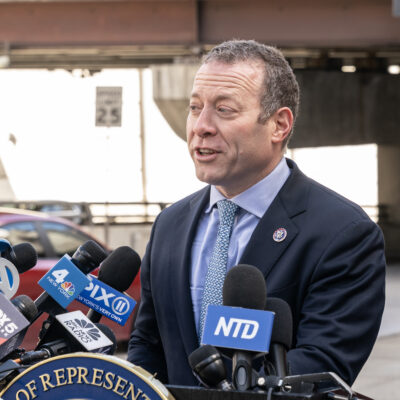Law & Order takes on campus antisemitism — with a violent twist
The Oct. 7 Hamas attacks in Israel and the resulting war in the Middle East are roiling college campuses. The hit NBC crime drama dove into the issues in its season premiere

Hippolyte Petit/WireImage
Hugh Dancy (L) and Sam Waterston attend NBC's "Law & Order" Press Junket at Studio 525 on February 16, 2022, in New York City.
A pro-Palestine professor accused of indoctrinating students to hate Israel. A university president facing plagiarism accusations and juggling how to handle free speech in the wake of the Oct. 7 terror attacks in Israel. Graffiti, torn-down hostage posters, and a brawl between pro-Israel and pro-Palestine men.
No, this isn’t Harvard. All of these scenes appeared in the 42-minute season premiere of Law & Order, which aired on NBC Thursday.
The popular crime drama, which just kicked off its 23rd season, has long been known to spin headlines into story arcs. Thursday’s episode, titled “Freedom of Expression,” was particularly striking because the heated atmosphere it depicted still rages on university campuses across the United States.
“When did expressing your beliefs become so fraught?” one detective asked another as they were investigating a series of violent incidents stemming from the conflict overseas. “When it comes to Israel and Palestine,” his colleague responded, “forever.”
The episode took on a question that has perplexed university administrators — when does free speech cross a line into hate speech, particularly when it comes to antisemitism and the Israeli-Palestinian conflict — and imbued it with a Kafkaesque series of gruesome twists and turns.
The central drama is the murder of a president at a fictional New York City university. Although he is Jewish, the president took a stridently pro-free speech line in the wake of the Hamas attacks that killed more than 1,200 people in Israel and declined to weigh in on the growing war in the Middle East.
But after his stabbing, it becomes clear that the situation on campus had grown complicated. A pro-Palestinian student group was shut down after students expressed support for Hamas, and the president took out a restraining order against a pro-Israel professor who claimed to have been fired for expressing anti-transgender beliefs. The detectives discuss the role of social media in amplifying emotions (“It is not a great time to have an opinion, is it?” one asks), and they quibble over adjectives, like whether to call an anti-Israel protest “hateful” or merely “offensive.”
By the end of the episode, two more people are dead. The episode’s writers also managed to fit in a discussion about the role donors should play at a university and several highly specific mentions of current events, like a reference to a controversial Palestinian cultural festival that took place at the University of Pennsylvania in September.
By the end of the episode, the detectives, exhausted and distressed by the complexity of prosecuting a case rife with political sensitivities, are ready to return to their other cases.
“At the very least it’s over,” one said.
“It’ll never be over,” the assistant district attorney responded.
On the show, the assistant DA comes from a Lebanese background, made to complicate her own handling of the case. In reality, the actress who plays her, Odelya Halevi, is Israeli.
Since Oct. 7, her own postings on social media have been straightforward — she stands with Israel.










